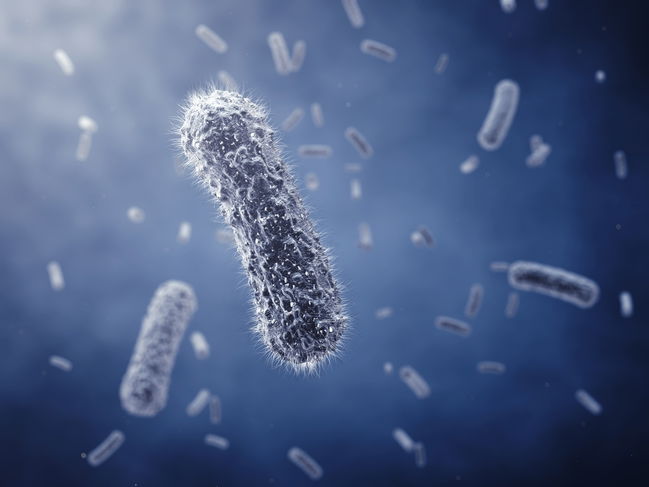Escherichia coli (E. coli) is a gram-negative bacteria that can cause infections like urinary tract infections or gastroenteritis. An E. coli infection is associate with symptoms such as watery or bloody diarrhea, or pain or burning when urinating.
This bacteria is naturally found in the gut and does not always cause symptoms. However, it can be easily transmitted through contaminated food or water, or it can overgrow due to an imbalance of genital flora.
Treatment for an E.coli infection is carried out by a general practitioner, infectious disease specialist, pediatrician, gastroenterologist or urologist. It usually involves rest, hydration and antibiotics.

Main symptoms
The symptoms of intestinal infections caused by E. Coli usually appear 5 to 7 hours after exposure to this bacteria. The most common symptoms of a urinary or intestinal E. Coli infection are:
- Abdominal pain
- Persistent diarrhea
- Pain or burning with urination
- Blood in urine or stool
- Cloudy urine
- PersistenT, low-grade fever
E. Coli infections should be assessed as soon as symptoms emerge. This way treatment can be initiated promptly, preventing further health complications.
E. Coli during pregnancy
It is common for many women to experience several UTIs during pregnancy, and in many cases, the UTI is caused by Escherichia coli. This bacteria can reach the urethra and start to spread, causing symptoms like pain, burning and urinary urgency.
Treatment for E. Coli during pregnancy is completed with prescription antibiotics. Infected women are also advised to increase their water intake to help eliminate bacteria in the urinary tract.
Online E. Coli symptom checker
Intestinal infections caused by E. Coli are very common and can produce very uncomfortable symptoms. To assess your risk for an intestinal infection, enter your symptoms below:
How it's transmitted
E. coli bacteria can be transmitted through:
- Contaminated food or water
- Contact with the feces of an infected person;
- Poor genital hygiene, like cleaning the anus from back to front;
- Not washing your hands after bowel movements;
- Urinary catheters or mechanical ventilation in hospitals.
Transmission of this bacteria is also prevalant among young children in school or daycare environments.
Diseases caused by E. coli
The main diseases caused by E. coli bacteria are:
1. Gastroenteritis
E. coli gastroenteritis is an infection of the gastrointestinal tract that can occur after consuming contaminated water and food. It can cause symptoms like high fever, watery or bloody diarrhea, nausea or abdominal pain.
2. Traveler's diarrhea
E. coli bacteria can also cause traveler's diarrhea, especially in people who travel to countries with poor sanitation or poor hygiene and food storage.
Other bacteria that can cause traveler's diarrhea are Campylobacter jejuni, Shigella or Salmonella sp. Learn more about the symptoms of salmonella and how it presents.
3. Urinary tract infection
A urinary tract infection (UTI) caused by E. coli can also develop due to changes in the flora that is naturally found in the genital tract. It can also emerge due to poor hygiene or holding your pee for a long time.
Also recommended: UTI Symptoms: Top 9 Signs (with Online Symptom Checker) tuasaude.com/en/uti-symptomsA UTI caused by E. coli infection is more common in women, due to the proximity between the urethra and the anus.
4. Pneumonia
Pneumonia is another disease that can be caused by E. coli bacteria. It is especially prevelent in hospital environmens and can
This bacteria can reach the lungs through the aspiration of oropharyngeal secretions or the use of mechanical ventilation. It can also enter the bloodstream due to gastrointestinal or urinary infections.
5. Bacteremia
When E. coli infections are left untreated, it is possible for this bacteria to reach the bloodstream and cause bacteremia. This is a serious condition that required treamtent in a hospital environment.
6. Peritonitis
Peritonitis is an infection of the peritoneum, which is the membrane that surrounds the abdominal cavity and covers the abdominal organs. Inflammation and infection of the peritoneum can be caused by several bacteria, including E. coli.
Generally, this type of infection is more common in people with ascites caused by liver cirrhosis.
Treatment options
Treatment for Escherichia coli based on the sensitivity profile of this bacteria, which is a test that relays this bacteria’s response to several antibiotics. Symptomatic patients with a UTI, for example, are often prescribed antibiotics like cephalosporin, levofloxacin or ampicillin.
Also recommended: UTI Medicine: 9 Prescription Medications (& Home Remedies) tuasaude.com/en/uti-medicineIntestinal infections are not always treated with antibiotics, however, as the body can usually eliminate E. Coli on its own within a few days. The doctor will likely recommend rest and increased fluid intake. Anti-diarrhea medications are not recommended, as the body will be unable to eliminate the bacteria, which can worsen the infection.
Another great way to regulate intestinal flow is through use of probiotics, which can be found in pharmacies and natural health stores.
Prevention measures
To prevent E. Coli contamination, you are advised to:
- Wash your hands after using the bathroom
- Wash your hands prior to eating
- Wash your hands before and after preparing meals
- Ensure food that is consumed raw (like lettuce or tomato) is thoroughly washed
- Avoid swallowing pool water, river water or ocean water
In addition, you should also take additional steps to disinfect raw foods. You should soak them for 15 minutes in water with 1 tablespoon of baking powder for every liter of water.






























